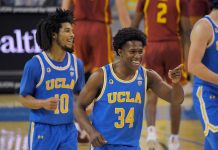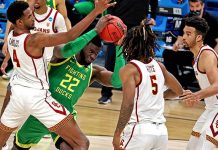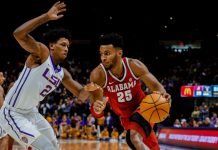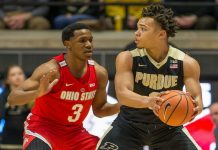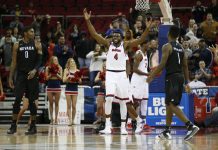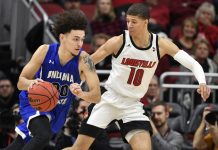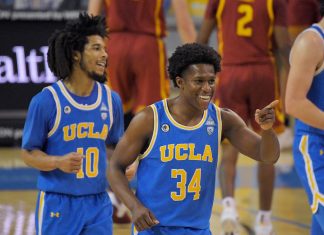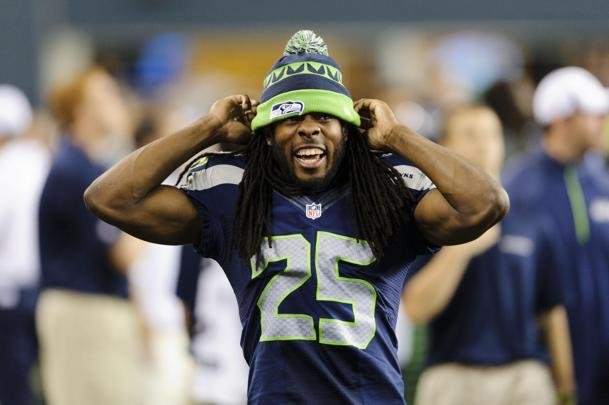KANSAS CITY, Mo. (AP) The NCAA has accepted Missouri’s self-imposed sanctions over infractions involving its men’s basketball program but it tacked on a year of probation though August of next year.
The NCAA infractions committee panel’s findings over what it said were roughly $11,400 in improper inducements and benefits given to players and a recruit by two boosters were released Tuesday, nearly seven months after Missouri admitted NCAA violations dating to 2011.
In January, the school hoped to blunt NCAA punishment by announcing it was vacating its 23 wins from 2013-14, banning itself from the postseason last season and stripping itself of one scholarship last season and a second scholarship no later than 2017-18.
The school, while agreeing to pay a $5,000 fine, also permanently banned one unidentified donor who the NCAA said provided impermissible benefits to three players and one recruit in 2013-14. The benefits included compensation for work not done at a business through a summer intern program, along with housing, $520 cash, local transportation, iPads, meals and use of a local gym.
The NCAA concluded that a second booster also provided impermissible benefits to 11 men’s basketball players and three members of a player’s family. Missouri has said those benefits included reduced rates at a hotel along with meals and a boat ride, and a student manager also provided transportation for multiple players to the hotel from the campus.
The Missouri system’s interim chancellor, Hank Foley, and basketball coach Kim Anderson welcomed Tuesday’s announcement as a turning point for the program after roughly two years of turmoil.
”As responsible members of the (Southeastern Conference) and the NCAA, we chose to self-report potential violations of bylaws and self-impose certain sanctions,” Foley said in a statement. Tuesday’s announcement ”is a clear indication this was a wise decision by the university and allows us to put these issues behind us as we continue to rebuild a top-notch basketball program.”
”Through cooperation between NCAA personnel, the University of Missouri and our Mizzou athletics staff, we are now able to draw this process to a close,” added Anderson, who is 19-44 in his first two seasons in Columbia. ”It has been my desire to move our program forward since learning of what had taken place.”
Missouri went 23-12 in 2013-14 – Frank Haith’s final season as coach before he left for Tulsa, not long after the school received a verbal notice of inquiry from the NCAA in April 2014, when Missouri hired Anderson. At that time, Anderson said he wasn’t aware of the investigation.
Haith, the former coach at Miami, was suspended for five games by the NCAA at the start of the 2013-14 season for inadequately monitoring former assistants interactions with a disgraced Miami booster and then trying to cover up a five-figure hush money payment to keep potential violations hidden.
The investigation found that Haith and Miami assistant coach Jake Morton paid Nevin Shapiro $10,000 after he threatened to expose previous improper contact with high school recruits and amateur coaches.
Haith’s Kansas City attorney, Scott Tompsett, said Haith ”cooperated fully with the NCAA’s investigation and was not named in or held responsible for any of the violations.”
”As the NCAA Infractions Report makes clear, violations happened while Coach Haith was at Mizzou and they continued after Coach Anderson became the head coach,” Tompsett wrote in an email to The Associated Press. ”The fact of the matter is that this is not a Frank Haith issue or a Kim Anderson issue; it’s an issue of Mizzou as an institution not adequately monitoring the summer employment arrangement. That’s what the NCAA found and Mizzou agreed.”
Haith, Tompsett added, ”wishes the best to the University of Missouri and its men’s basketball program.”
A message left Tuesday with Haith at his Tulsa office was not immediately returned.
25% Bonus via Western Union


